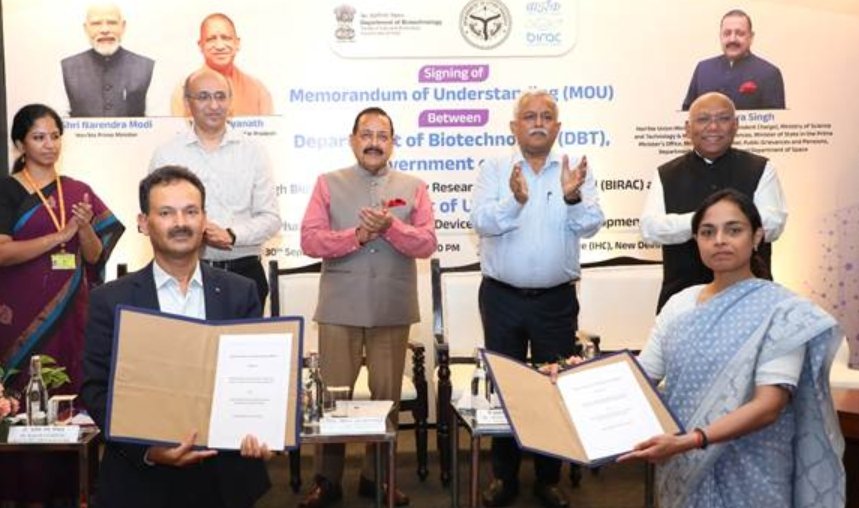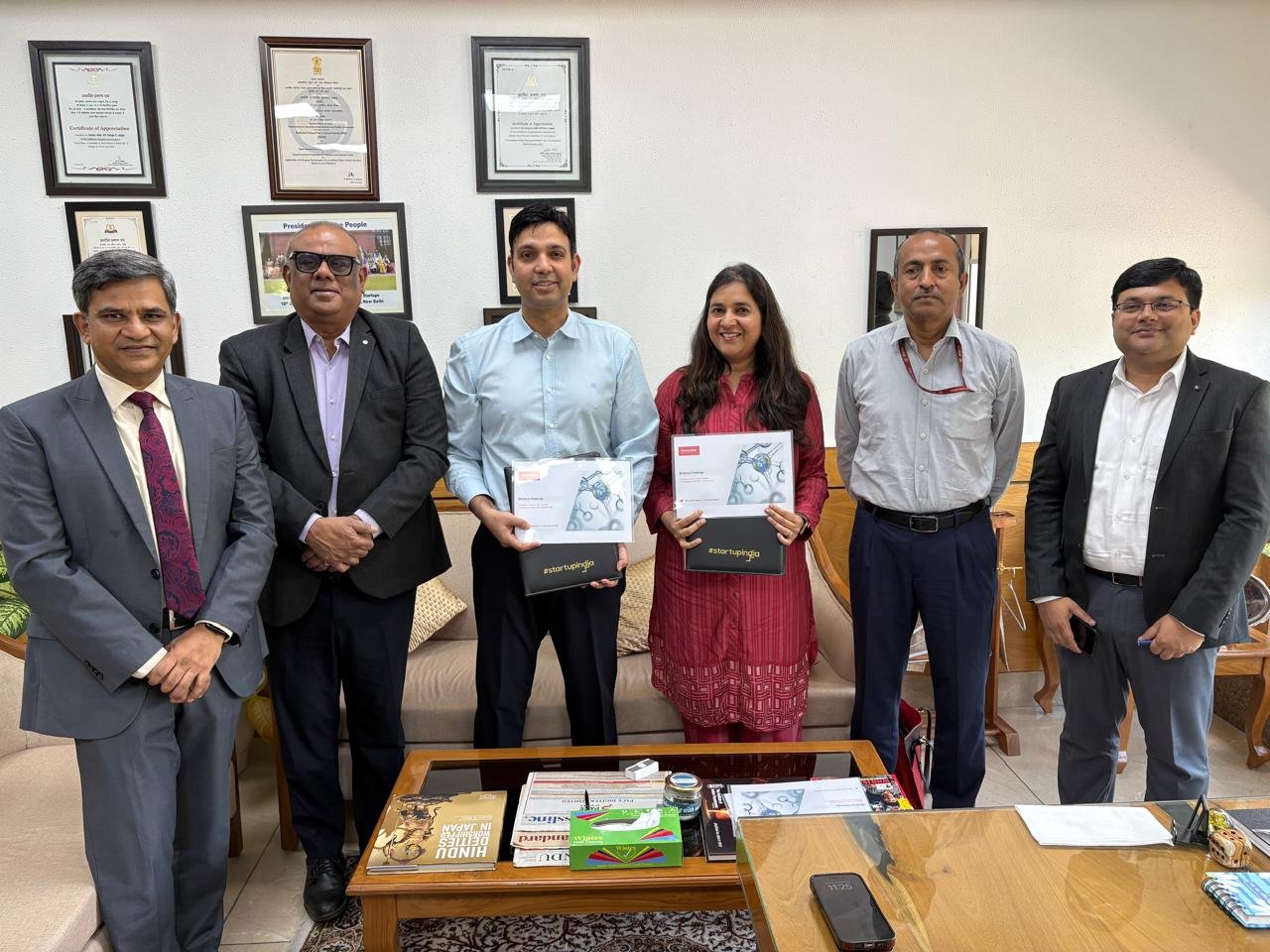Hottest Indian start-ups on the block: Geniron Biolabs
October 13, 2015 | Tuesday | Features | By BioSpectrum Bureau
Hottest Indian start-ups on the block: Geniron Biolabs
(Photo Courtesy: www.thestarthubproject.com)
Starting-Up
Geniron's founders and veterinarians Dr Goutham (28) and Dr Prashanth (28) quit their cushy dream jobs to begin their new chapter as entrepreneurs.
Dr Goutham, who hails from sub-urban Hassan, worked as a veterinary officer with the Government of Karnataka, while Dr Prashanth from Anekal was employed with the iconic Bangalore-based Biocon.
The duo pursued their Bachelor's studies together in Veterinary Science in Bidar. It was then both of them dreamt of starting their own venture.
At the same time, Dr Goutham and Dr Prashanth began to pursue their Master's degree in the same space, specializing in Veterinary Microbiology and Animal Biotechnology respectively.
Armed with extensive knowledge in Veterinary and having seen issues surrounding animal healthcare in India, both of them started Geniron, with the aim of serving the animal industry through vaccines and diagnostics, along with contract research services in animal studies to serve the pharma and biopharmaceutical industry.
However, it took 5 years to start the company with a clear, concrete idea and definite vision.
Adds Dr Goutham, "There was always an itch in us to start a venture. In our third year during undergraduate studies, we both decided to start our own company, but we had a lot of different ideas to start-up in the animal husbandry and healthcare sector."
Awards Into Investments
However, the path became very clearer after the duo won the BEST-ABLE award in 2012.
"It made a larger impact, and we chose to be in the animal healthcare sector and started Geniron," says Dr Prashanth.
The prize money was carefully invested in the development of the company. Investments worth Rs 20 lakh from family and friends were also pooled in.
The company's establishment -- from registration to the setting-up of the infrastructure facility -- was shared equally between the two.
"From then on it has been a roller coaster ride," says Dr Goutham.
"Later, for our R&D, we were awarded with BIG funding from DBT, which gave us a boost for developing products and procurement of equipments," recalls Dr Prashanth.
Till now the company has invested nearly Rs 40 lakh, majorly for equipments and infrastructure.
"Initially there were challenges during setting-up of facilities, especially the laboratory animal facility. The approvals needed for the facility and registrations with the government took a snail's pace, taking about more than a year or so. With respect to R&D, we were a little challenged, whether to go on with our own facility or approach an incubation center," says Mr Goutham, who is an avid avian photographer.
Dr Prashanth advises that starting-up on own is the ideal way if there is a cash flow model along with the R&D.
"But for a start-up with a primary focus on R&D, they should seek to be incubated or join an accelerator as it reduces the burden of purchasing and maintaining of instruments. Proper and clear guidance through mentors in the incubator makes R&D easier," he reasons.
Vaccine Pipeline
The Bangalore-based company is working on novel animal vaccines, diagnostics and nutraceuticals towards enhancing animal health and productivity.
It is also working on a complete technology package for Rabies eradication in India, as per the recommendations of World Health Organization (WHO), in terms of combined DNA for Rabies and contraception.
Currently the company offers contract research services in animal-related studies, from antibody services to pre-clinical trials.
"In the future we'll have 3 to 4 animal vaccine candidates and diagnostic kits for both humans and animals, which are in the pipeline, and will be launched in 4 years," reveals Dr Goutham.
The company now caters to various research institutes, colleges, start-ups in biotech, and major MNCs.
Expanding Abroad
Geniron is now looking at great opportunities in animal healthcare sector for vaccines and diagnostics, mainly because of the increase in organized dairy farms, and sheep & goat farms, which are gaining popularity in India.
"Along with that, there is an increasing trend in having companion animals in India," says Dr Prashanth.
"With respect to CRO, we are expanding the infrastructure and upgrading to GLP facility in order to serve and partner with the pharmaceutical industry in drug discovery and development," points Dr Goutham.
At the moment, Geniron aims to scale-up within India. "Right now, there is no intention of expansion to other countries. Maybe 5 to 6 years down the lane we would be interested in expanding to the US, Europe and Africa," opines Dr Prashanth.
Revenue Targets
Since the company is in its R&D phase, the focus for the next 2 years will be concentrated towards product development and market launch.
"In our contract research services, we are having a target of Rs 3 crore as revenue generation in the next couple of years," shares Dr Goutham.
Funding Flummoxes
Since the beginning of Geniron's establishment, it is actively pursuing R&D collaborations with Centre for Cellular and Molecular Platforms (C-CAMP), and Institute of Biotechnology and Applied Bioinformatics (IBAB).
Today, ideas and innovations of start-ups are taking healthcare and lifestyle of people into the next level.
"The major constraint for a start-up is the financial support, since the gestational period of product development is 2 to 5 years. Government should take a major role in funding start-ups in Life Sciences industry through grants and soft loan schemes," suggest both the founders.
Dr Prashanth emphasizes that when it comes to funding, Government grants should be the top priority for a start-up.
"It is crucial to have financial support with adequate mentoring and monitoring from agencies to help start-ups reach their goal. Next on the list are angel investors, and lastly, venture capitalists," he expresses.
He also points that billion-dollar start-ups are possible in India when innovative ideas of the new generation are supported and nurtured by the Government and big players in the industry.
Are there any unusual ways of funding Life Sciences start-ups? "Yes," says Dr Goutham. "If a start-up has a product or a service idea, which has the applicability as a byproduct to other companies, then it should approach those companies explaining how it can solve their problems. In the process the company ends up funding the start-up, and in turn help take the start-up's research to the next level or make a finished product."
West's Style
Dr Prashanth stresses that in the Western countries, there are major collaborations happening between the academia and start-ups, where they work together to develop a product.
The academia usually licenses out the shared patent to start-ups, which enables cash flow for the start-up's further establishment, making it to stand as a unique enterprise in the market or industry.
"But in India," Dr Goutham says, "there are no major academic and startup tie-ups for invention of a product or technology. This is the need of the hour. Our Government should take initiatives towards making this work."
Shareholders & Returns
In the eyes of Dr Goutham, Pune and Chennai seems to be the next upcoming hub for biotech start-ups mainly due to conducive institutional support available for start-ups.
In the tech industry, the gestation period is short for product development, and the product lifecycle may vary between 2 to 5 years, where investors can expect returns very early.
"Whereas," explains Dr Goutham, "Life Sciences industry is a long-term investment, where the gestation period for a product is 5 to 9 years, and product lifecycle is up to 20 years. Investors in Life Sciences should invest and relax for higher returns in the longer duration."
Relentless Journey
Dr Goutham says that in-depth knowledge and passion is more important to be an entrepreneur in Life Sciences.
"Degrees do add value or give a tag to establish in the market, but most of the great inventions were invented by college drop-outs" he points.
Failure is a part of entrepreneurial journey, remarks Dr Prashanth.
"Never be depressed, and opportunities are like buses. If you miss it, the next one will be ready, but you have to be ready and prepared to get into the bus and seize the opportunity," he states.
He continues, "Never wait for the right time and never think too much about the pros and cons of a venture. Just start at it! Take calculated risks, and never think negatively. Just enjoy the moment."
Adding to this, Dr Goutham says, "If you have a unique idea which can be commercialized and can make an impact on the world, just jump and indulge in it. Thinking too much doesn't make the impact. But action does!"
Dr Goutham concludes saying that he keeps himself enthused by reading motivational books.
"As I said earlier, entrepreneurship is a roller coaster ride. There are ups-and-downs. We usually read good motivational books and engage in TED videos to boost ourselves and bounce back with more enthusiasm," he concludes.
Entrepreneurial Mistakes To Avoid:
1. Being too ambitious
2. Assuming product acceptance as easier
3. Diverting or deviating from company's primary focus










